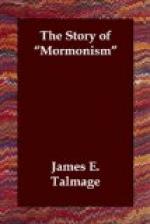Then with propriety it may be asked:—What shall become of those who lived and died while the Priesthood was not operative upon the earth?—those who have worked out their mortal probation during the ages of the great apostasy? Furthermore, what shall be the destiny of those who, though living in a time of spiritual light, perhaps had not the opportunity of learning and obeying the gospel requirements? Here again the inherent justice of “Mormon” philosophy shows itself in the doctrine of salvation for the dead. No distinction is made between the living and the dead in the solemn declaration of the Savior to Nicodemus, which appears to have been given the widest possible application,—that except a man be born of water and of the spirit he cannot enter into the Kingdom of God. (John 3:1-5.)
“Mormonism” proclaims something more than a heaven and a hell, to one or the other of which all spirits of men shall be assigned, perhaps on the basis of a very narrow margin of merit or demerit. As it affirms the existence of an infinite range of graded intelligences, so it claims the widest and fullest gradation of conditions of future existence. It holds that the honest, though, perchance, mistaken soul who lived or tried to live according to the light he had received, shall be counted among the honorable of the earth, and shall find opportunity, if not here then in the hereafter, for compliance with the requirements essential for salvation. It teaches that repentance with all its attendant blessings shall be possible beyond the grave; but that inasmuch as the change we call death does not transform the character of the soul, repentance there will be difficult for him who has ruthlessly and willfully rejected the manifold opportunities afforded him for repentance here. It asserts that even the heathen devotee who may have bowed down to stocks and stones, if in so doing he was obeying the highest law of worship which to his benighted soul had come, shall have part in the first resurrection, and shall be afforded the opportunity, which on earth he had not found, of doing that which is required of God’s children for salvation. And for all the dead who have been without the privileges, perhaps indeed without the knowledge, of compliance with Christ’s law, there shall be given opportunity in the hereafter.
Nevertheless, this life of ours is no trifle, no insignificant incident in the soul’s eternal course, having but small and temporal importance, the omissions of which can be rectified with ease by the individual beyond the veil. If compliance with the divine law as exemplified by the requirements of faith, repentance, baptism, and the bestowal of the right to the ministrations of the Holy Ghost, are essential to the salvation of those few who just now are counted among the living, such is not less necessary for those who once were living but now are dead. Who are the living of today but those who shortly shall be added to the uncounted dead? Who are the dead but those who at some time have lived in mortality?




